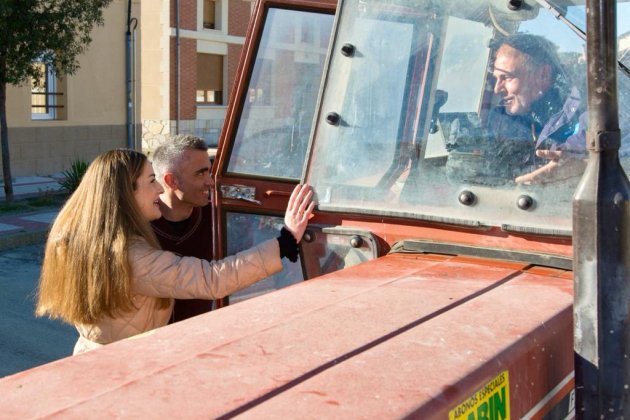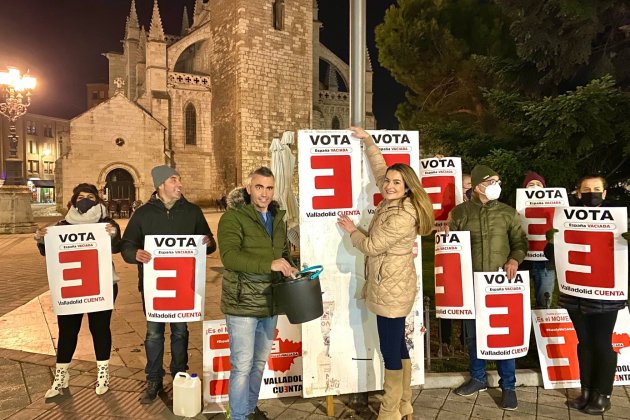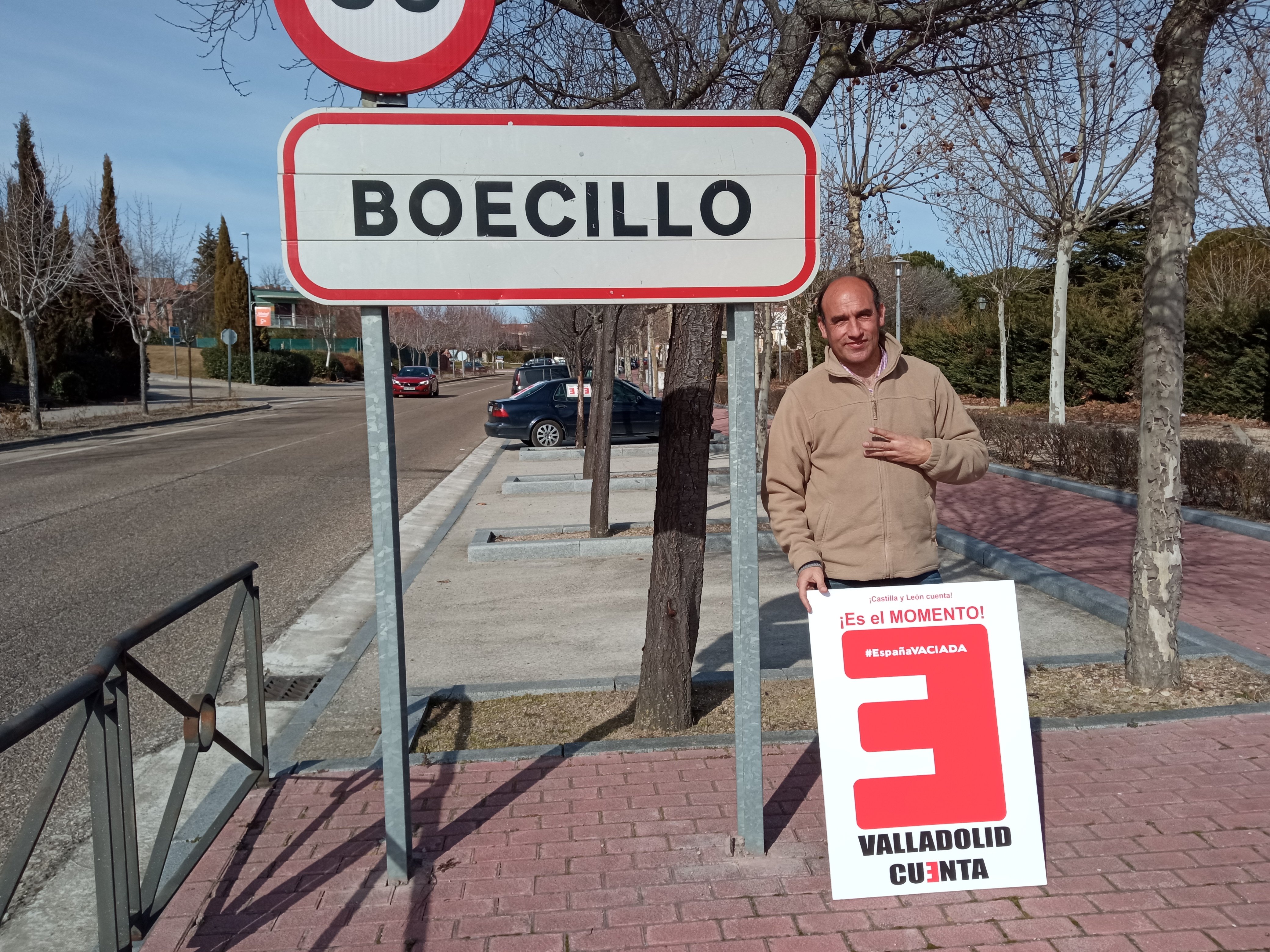Alejandro Estébanez, known to everyone as Jandro, lives in Boecillo, a town of 4,000 inhabitants in Valladolid province, within Spain's vast north-western heartland, Castilla y León. For twenty-eight years he was a lorry driver and today he is a city council employee at the provincial capital. He became involved in politics, through Ciudadanos (Cs), but left disillusioned. Now, however, he has decided to have another go. He is the number three on the constituency list for the candidacy of the new España Vaciada platform - "Empty Spain". He is also in charge of the Valladolid campaign. With their limited resources, they do everything themselves. Why is he doing it? "Because we have a very serious problem, depopulation, and here nobody is doing anything about it," he told ElNacional.cat three days before the date with the ballot box.
The early election called for this Sunday in the autonomous community of Castilla y León caught the new political platform off guard. Encouraged by the 2019 success of Teruel Existe - "Teruel Exists" - in another part of Spain's often-forgotten interior, the Empty Spain platform was preparing for the municipal and regional elections of 2023. Nevertheless, they have been able to assemble candidacies for five of the nine provinces in Castilla y León: Valladolid, Burgos, Soria, Salamanca and Palencia. And - although it applies to some constituencies more than others - the polls say they have the wind in their favour. The latest poll by the CIS public research agency, made public this Monday, gives two or three seats to Soria Ya ("Soria Now") while Vía Burgalesa (Burgos Way) is on the verge of taking a first seat. With election majorities still unclear, these provincial campaigns within the Empty Spain platform, as well as those of other parties like For Ávila and the León People's Union, could be key to the governance of the largest region in Europe. That is just the influence they seek in order to put their agenda on the table. The candidate who wants to form the next Castilla y León government with their votes will have to keep in mind the depopulation issue "in all political areas".

With election majorities still unclear, these platforms could be key to the governance of the largest region in Europe. Just the influence they seek in order to put their agenda on the table
The problem of depopulation affects all of Castilla y León, some provinces with more intensity and others with less. Valladolid is one of the least affected, but it is still noticeable: here, there are at least 58 villages with populations of fewer than 100 inhabitants. And even the largest municipalities are losing residents. "It's not just that people are leaving, but it means a step backwards for services. It means a lack of medical centres, bank offices, and even bars and grocery stores,” says Estébanez. Their star proposal is a simple question of minimums. They call it Plan 100/30/30: a minimum of 100Mb of Internet throughout the territory, a maximum of 30 minutes to access basic services (for example, a health centre) and a maximum of 30 kilometres to the nearest high-capacity road.
Who emptied the so-called Empty Spain? Alejandro Estébanez points the finger at both of Spain's main parties: “Here, the PP and the PSOE have been in power for forty years and they are the two most responsible. No one else has ruled here since the Transition of the 1970s.” And he considers that, among administrations, the blame is quite widespread. Between Valladolid, Madrid and also other territories: “Even the rich regions, which have ignored the poorest ones. We need to show solidarity with the whole of Spain”.

"The PP and the PSOE talk a lot, but what they actually do is very little. We feel cheated and that's why we stepped up"
They have had enough of "empty words", declares the Empty Spain candidate. He cites the example of his village, Boecillo, where a walkway was to be built, which was included in the Spanish government budget for 2018. “We are in 2022 and they have not yet laid the first stone," Estébanez laments. "They talk a lot, but what they actually do is very little. We feel cheated and that's why we stepped up", he adds.
The same thing has happened with agriculture and livestock, which they assert that they themselves have turned into a live issue. "[The main parties] never set foot on a farm and now they don't leave. Casado dresses as if he were going to the office. And they arrive and then talk about other things, about Catalonia or whatever." In fact, a couple of hours before this interview, PP leader Pablo Casado had made some campaign statements - without taking questions from the press - at a winery, where he spoke about the wine sector, but also about ERC, EH Bildu and ETA. They talk about everything "except Castilla y León", says Estébanez.
Nor have the other new parties of the past decade provided solutions, after promising to regenerate the political life of Spain. This is the case of Ciudadanos - the source, curiously enough, of 14 of the 18 Empty Spain candidates in the Valladolid constituency. It is the case of Alejandro Estébanez himself, who in the 2015 Spanish elections was number three on the Cs list for the province. But it is also the case of the number one on the candidacy, Cristina Blanco, who was elected as a councillor for Ciudadanos in the town of Medina del Campo. She broke with the party in 2020, along with her partner Susana Herrera, also on the Empty Spain list. Today both continue in the council as independents.
"The Ciudadanos project has been disappointing. They have not capable of doing anything"
Estébanez ended up disillusioned with party now led by Inés Arrimadas. He left Cs, without even holding an elected post, because "there were internal problems in Valladolid." "The party did not back its people, its members," he says, adding “The project has been disappointing. They have not been capable of doing anything. They talked a lot about transparency, but at the moment of truth, it didn't exist. They were just looking for chairs for their leaders to fill, and we had to leave." Unlike Empty Spain, he does not see much future for Cs, because they have no "party base".
They also stand out from other movements, such as the regionally-based Leonesist movement, represented mainly by the León People's Union, which supports the separation from the autonoous community of the provinces of León, Zamora and Salamanca. "We are in favour of union. There are nine provinces and we are convinced that union is strength", replies Estébanez.
The candidate for re-election to the Castilla y León presidency, the PP's Alfonso Fernández Mañueco, has been contemptuous of the new platform during the campaign. "Localism in Castilla y León is the same as separatism in Spain," he said at an event in Soria, a province where Empty Spain could cause some damage. After two weeks wearing rubber off his shoes, Estébanez ignores such assertions: “We are not nationalists. We simply put a focus on our territory and on all the territories that suffer from this depopulation. And we are here to stay. "

